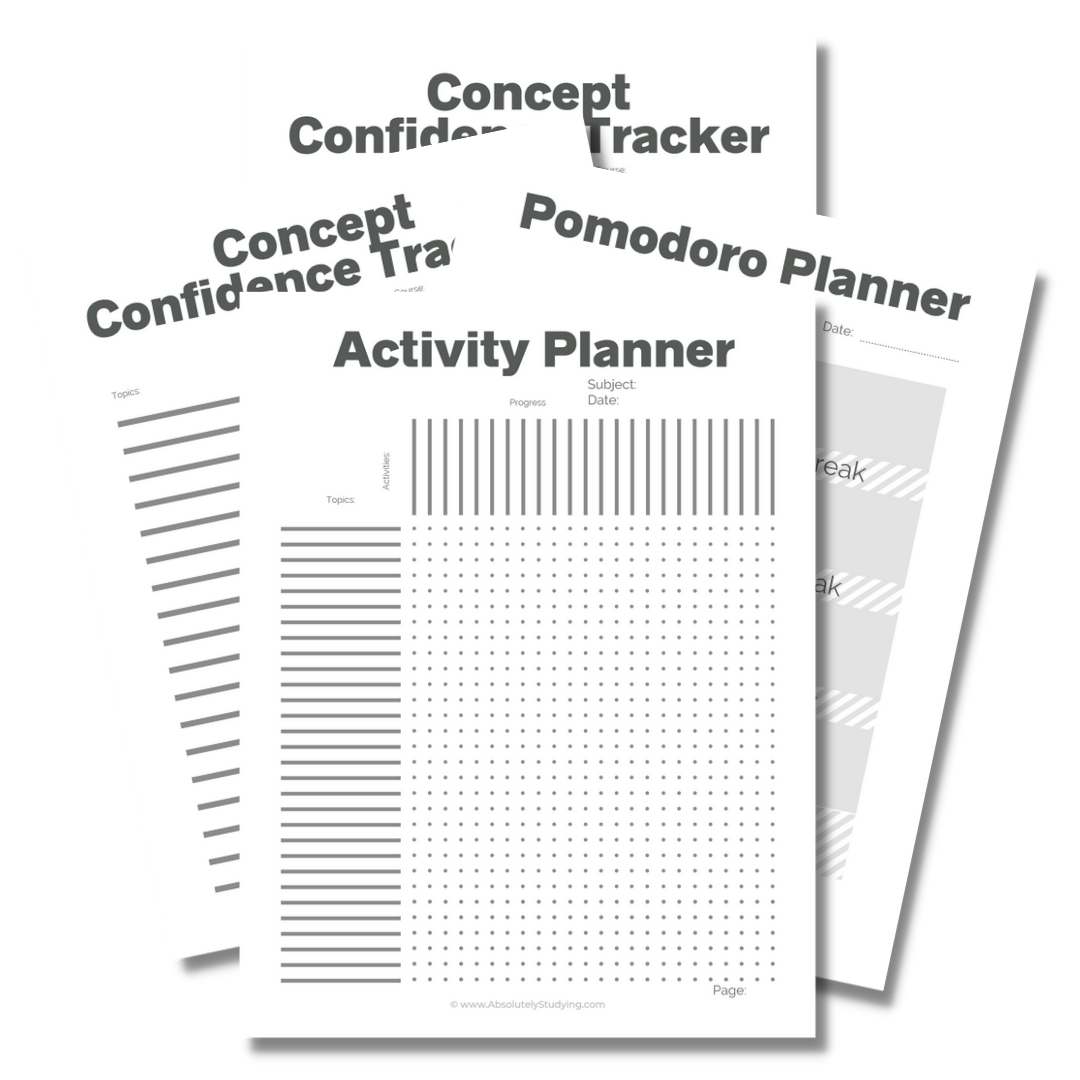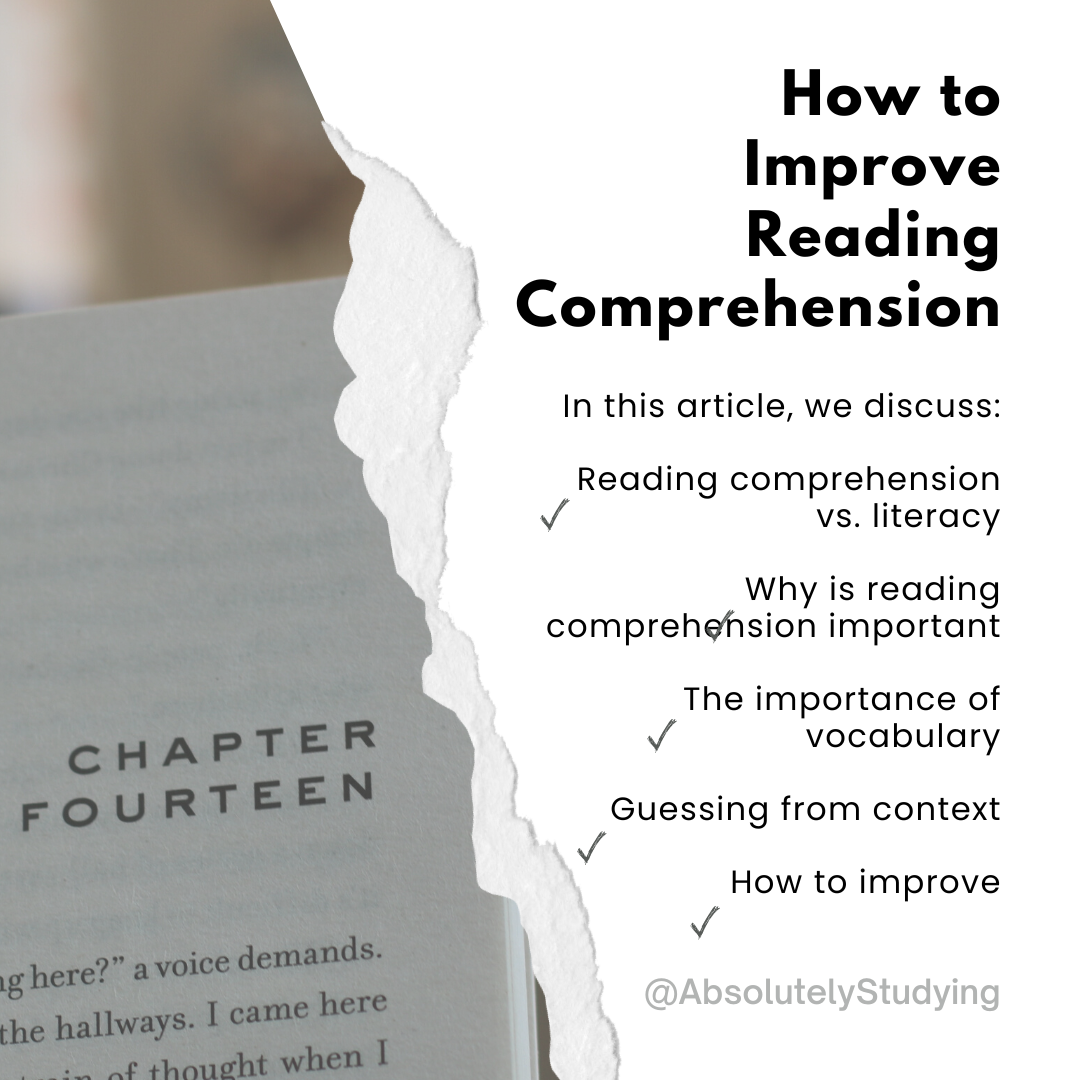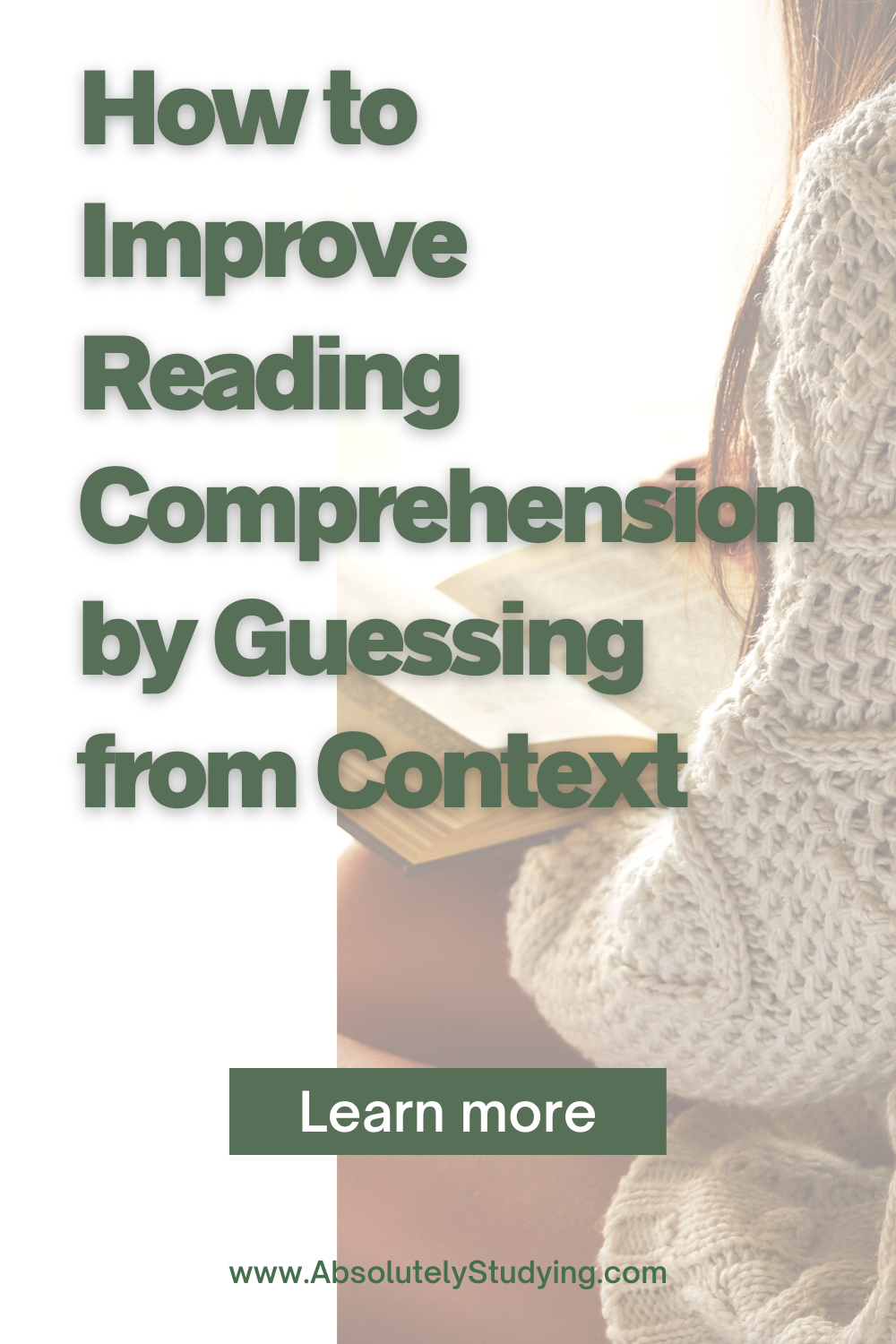How to Improve Reading Comprehension by Guessing from Context
How to Improve Reading Comprehension
Reading comprehension strategies to use during your next study session.
Everything you need for the semester you want!
This bundle includes:
The Syllabus Study Planner
The Pomodoro Planner
A Confidence Tracker
A Q&A planner
The “Get Organized Checklist”
and more!
This workbook is full of super useful resources that can be applied to every aspect of your day.
* Disclaimer * Some of the posted links are affiliate programs. By clicking these links, I may receive monetary compensation. This will not alter the price or change the buyer's experience.
Reading a textbook is really hard. Even if you are an avid reader. These texts are dry and dull. It's more important that they convey information than entertain the reader. Because of this, reading comprehension is super important in college and university.
Because reading your textbook can be so boring, it's essential you get as much information out of it as possible the first time you read it. You want to understand what you are reading from the start so you can move on to more exciting study activities.
Unfortunately, you are going to be reading a LOT. This is probably something you will have to do every day. University courses require a ton of reading because the textbook will explain things differently than the professor.
The professor won't have time to go over every concept several times in class. They often dedicate one class to a specific idea, then quickly move on. Your textbook, however, can be referenced any time you are unsure of a topic or need to review a process. That is why you end up reading so often.
If I don't feel like doing something, I swear my attention span is cut to a quarter. After reading pages and pages, I catch myself and realize that I've forgotten everything that I just read. It's like I forgot to pay attention.
I get super frustrated because I feel like I wasted so much time. But sometimes, I just can't help it. It's boring reading a textbook for hours.
When you add reading comprehension activities to your study session, you can be more engaged in what you're reading. This will make it more likely that you won't "forget" to pay attention.
Download Now: FREE Study Planner & Activity Tracker
Download your free study planner and activity tracker.
Everything you need for the semester you want!
Rotating study activities helps you to have fun during your revision sessions. They don't have to be dull, boring, and repetitive. You can introduce new study activities and rotate through the ones you like. Doing this will shake up each revision session so you don't feel like you're constantly doing the same things over and over.
Stirring things up can help you build more mental associations with the information so that you can retrieve it when you need it. It's like you are making a whole network of cues that lead to the focus you are studying. The more cues, the easier it will be to find the information you need when you need it.
You will be using your brain at a higher level of functioning than just reading. Not only will you be more engaged, but it will help you to remember better. Each of these small tricks adds up to better memory retention, which can be a big help.
Reading Comprehension vs. Literacy
Reading comprehension is different from literacy. Literacy refers to the ability to read, while reading comprehension refers to the ability to understand what you read.
All students know you can read a sentence and still not understand it. But the good news is that reading comprehension can always be improved.
Small steps can be taken and added to your reading sessions that boost reading comprehension. These strategies will increase your ability to understand and synthesize the information as you read it. They also work double-time as they will help you to remember the information better as you study.
There is a big jump in the technical reading skills from high school readers to university textbooks. Some students may not have been prepared for this in high school. But this doesn't mean they have to struggle throughout university. Instead, they can practice these reading comprehension strategies to improve their understanding as they study.
What is Reading Comprehension, and Why is it Important?
Reading comprehension is the ability to understand and synthesize information the first time you read it. This means that you can understand what you are reading better and relate it to concepts you already know.
This helps you both learn this new topic more efficiently and recognize how it builds upon foundational themes. This will elevate your understanding by working with the topic and understanding how it functions more effectively.
For example, the ability to guess the meaning of a word using context is directly related to grammatical knowledge. When you try to use problem-solving to guess a word's meaning, you directly assess the grammar and structure of the surrounding words and sentences to gather clues to the word's meaning. This will help you with both reading comprehension, grammatical structure, and overall literacy.
Using reading comprehension strategies like guessing from context keeps your brain alert and engaged. Your brain loves puzzles and problem-solving. It helps your brain hone cognitive abilities and gives it something interesting to do. This means you will be more engaged in your readings and less likely to go on autopilot.
Using context clues helps to increase problem-solving skills. This will aid in critical thinking throughout your university career. You can translate this skill to so many different areas in life. Practicing this skill here, in a controlled setting, is a great way to exercise your problem-solving abilities.
Taking these extra steps will also help you to synthesize information and reconcile it with old knowledge you already have learned. This will help fit the concepts together, giving you a better understanding of how everything works.
New concepts are built on top of old ones. When you can relate new teachings to the foundational theories they are built upon, you will understand them more easily.
These extra steps will help you to make more connections and mental associations. This is like building an intricate web of clues to lead you to the location where the information is stored.
Sometimes, when you are writing a test, you know that you learned this information, but you have trouble retrieving it. Creating as many links to the information as possible will help you get to the information when you need it.
How to Improve Reading Comprehension by Guessing from Context
Reading comprehension can be improved by applying these strategies every time you read. You can implement these practices both in academic readings, like your textbook, or reading for pleasure.
Whenever you come across a word you don't recognize, resist the urge to look it up. Instead, you can transform this into an effective learning activity.
Take this opportunity to apply these problem-solving strategies to build mental associations. This will help you learn this new word more efficiently and more likely to be able to use it again in the proper context.
These strategies are best used during the skimming or scanning phase of reading your textbook, although you can apply them at any time. But if you use it during the skimming method, you will test your recall when you are ready to read the passage for real. This will allow you to reinforce your memory with the definition.
Reading Comprehension and its Relationship with Vocabulary.
Reading comprehension and vocabulary are intricately linked. The larger your vocabulary, and the more words you know and can use easily, the higher your reading comprehension.
You can not separate one from the other. Reading comprehension is all about being able to understand what you are reading. If you don't recognize a word, you can't understand precisely what that sentence is trying to relay, resulting in a reduced understanding. By building up your vocabulary, you will be able to better understand what you are reading.
New vocabulary words that you don't understand or only slightly think you know are great learning opportunities. By applying problem-solving strategies, you will learn the definition of the word and how to use it in a sentence, and you will be more likely to remember the word in the future.
Taking these steps is more effective than simply looking up the definition. That's because going through this process with intention will strengthen the placement of the meaning in your memory.
Adding this word to your vocabulary and learning to understand it increases your understanding, resulting in better reading comprehension. Next time you come across this word, you will draw upon what you learned using these strategies and understand it better. You will also be able to use this word more naturally in a sentence next time you need to.
Skim the passage you are reading for context.
Skim over the paragraph where the word is found. What is it trying to say? When you read the section, what would you assume the word means, even if you don't know its exact definition?
Use the surrounding words to try to find clues as to what the word might mean. Can you get an impression from what the author has written?
Write down your best guess for the word's meaning or even other words that could stand in for it. Even if you can't think up a formal definition, it's okay to try and think of other words that might mean the same thing.
You can also check out any diagrams or charts. Is the word depicted or used in a picture? If there is an entire process in the illustration that reflects the word, then study the diagram. Some words are going to be much more technical than others. Something like "metabolism" has many meanings in everyday use. Also, it refers to a complex process where cells turn glucose into energy.
Check out these charts and diagrams, pay special attention to what information they relay, and see how much data you can gather from them. Do you understand what they are describing? Do they make sense? Are you able to follow along and understand?
Refer back to the paragraph and see how many clues you can put together.
Isolate the prefix and the suffix OF THE WORD YOU ARE STRUGGLING WITH.
Many words are made up of combinations of root words with a prefix and/or suffix. If you can break apart a word into its fundamental components, you might be able to figure out what it is trying to say.
The prefix is a word or letter placed at the beginning of the root word that can change the meaning.
Let’s use prefix as an example:
Prefix = Pre – before
Root word = Fix – attach
We are attaching a phrase before the original word to change its meaning.
The suffix is a word or letter placed at the end of a root word that can change the meaning.
Let's take comprehension, for example:
Root word = Comprehend – to understand
Suffix = Ion – a process or result
Comprehension is the process of coming to understand something.
When you break apart a word you don't understand, you can sometimes get an idea of what it means by examining the root word along with the prefix and/or suffix:
First, decide what the root word is.
Then, isolate the prefix and the suffix.
Write out what each piece of the word means.
Brainstorm what the word might mean based on these components.
Compare the possibilities to the context.
This process gets you thinking about what the different meanings could be, depending on the context. When you are trying to decide what meaning is more likely, use the common-sense rule:
The Common-Sense Rule:
Does the meaning of the word make sense, given what the paragraph is saying?
Ask Who, What, Where, When, and Why.
Ask the 5 W's every time you come across a word that you don't understand. These questions are always helpful. Any good problem-solving strategy will incorporate this tactic.
See if these questions change your opinions of the answers you came up with in the last exercise. They will also help you to deepen your understanding of the material you are reading.
It might sound silly, and of course, not all of these W's will apply every time, but you may be surprised at some of the questions you meet once you actually go through the trouble of phrasing them.
Write out your assumptions.
Write out all of the different meanings you think the word can have. As you work through each of these steps, it will be easier to track and eliminate your guesses when they are written down. This way, you can better track what you think the word could still mean and what you have rejected.
This will also make for an interesting read once you finally look up the actual definition. It will be fascinating to see if you had the correct meaning and decided against it. Then, you can examine why you decided it was not a workable option.
Both writing these definitions down and crossing them off create more mental associations. Putting your thoughts into words is a lot tougher than you would expect. It is easy to have an idea in your mind, but if you can not put it into words and communicate it, you can't prove you understand it. This is what testing and assignments are based on, your ability to communicate the concepts clearly.
Writing these down and adding them as multiple-choice questions on your practice tests is also a great strategy. It will ensure that you have committed the true meaning to memory and not your previous assumptions.
Look up the definition OF THE WORD.
It's finally time to look up the definition in the glossary or dictionary. Once you do, compare it to the different assumptions you made in the earlier exercise.
How close were you? Were there subtle differences between what you thought it meant and what the actual definition was?
Write down the definition and list the similarities and differences between your thoughts and the actual meaning.
Next, search online for more variations of the definition. Compare their wording to your textbook. Were they more clear or easier to understand? Write them down, too, if you find them useful.
Study Skills Digital Course
Learn how to create a stress-free comprehensive strategy!
Rephrase the definition in your own words.
Re-write the definition in your own words. This is a powerful technique to help you to better remember the meaning of the word.
It's much more challenging to memorize someone else's words than it is to remember your own. Rephrasing into your own words will help you to do this. It also allows you to use words that are common to you and your vocabulary, making them easier to remember.
Start by changing the words individually, especially long or technical terms.
Now, change the sentence to make it more fluent.
Keep editing this definition until it is in simple words, easy to understand, and you are happy with it.
Write this definition out in your notes so you will be able to review it during your future study sessions.
Compare YOUR GUESS with the actual definition.
How does your reworded definition compare to what you initially thought the word meant? Were you very far off? How was it similar or different? Write these down so you can see the journey you have made in your understanding of this term.
Brainstorm synonyms FOR NEW WORDS.
Synonyms are words that have the same or very similar meanings to the one that you are studying. Think of some other words or short phrases that mean the same thing and write them down.
This gives you more words and a more extensive vocabulary to pull from, further increasing your reading comprehension.
Try to think up some antonyms.
Antonyms are words that mean the opposite of the one under study. Are there any words that mean the exact opposite of the one you've been studying?
Try to think up some words or short phrases that mean the opposite of the one you're working on.
Don't head straight to the glossary or dictionary whenever you find a word you don't know. This is a learning opportunity. Use this as a study activity that will increase your vocabulary and your reading comprehension skills.
This exercise is perfect for previewing a section before you actually start reading the chapter. This way, when you go back and read through the chapter, you'll have already had practice with all of these tricky words.
If you do this before you read the chapter, when you come across the word again, you will review and study it instead of learning it for the first time. This helps 2-fold.
It's another opportunity to review the word and test your recall of the definition.
You will not have to take in all this new information or learn a new word for the first time.
If you are looking for a better study strategy, pick up my free study planner and activity tracker. There are more than eight pages of goodies, including the activity tracker, confidence tracker, and Pomodoro-style study session template.
Create practice exams with the easy-to-use guide that lets you phase several questions for each concept. Download it here.
I would like to be transparent so that there are no misunderstandings. As an affiliate, I may earn a small commission from any products linked in this post. This is not a sponsored post, and I was not asked to recommend these products. These are products that I genuinely love and want to share with my audience.















